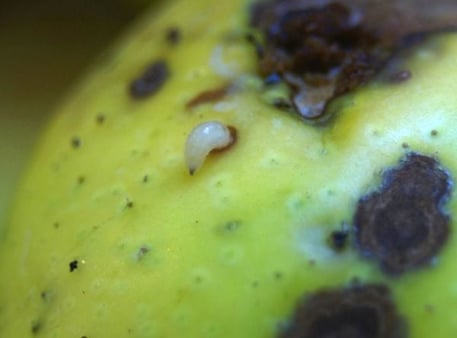We’ve all battled a persistent invasion of fruit flies at some point as homeowners; we think we can all agree it’s no fun! Drosophila spp. breed fast and even after you’ve scrubbed your kitchen from top to bottom, they seem to linger. As tiny as they are, fruit flies can be one of the biggest household pests. So, how did this infestation happen in the first place?
How did they get in your house?
Did it seem like the fruit flies appeared out of nowhere? More than likely they came in by way of newly purchased fruit that already contained eggs. They can also be attracted to your home by the scent of fermenting fruit. So if you have any fruit that’s been sitting in that kitchen bowl a bit too long, or even fruit ripening in the garden, fruit flies have a good chance of finding it. Because of their tiny size, they can easily make their way into your home through tiny cracks in window casings, doors or even the patio door left open for only a few minutes.
Lifecycle of a Fruit Fly
Fruit flies reproduce quickly! In as little as eight days, they can transform from an egg to an adult. Once they are in your home, they don’t necessarily need ripening fruit to complete their lifecycle. Any old slimy sponge or bit of drain water will do. Kitchen plumbing and disposals are the perfect place for them to hide.
A male fruit fly will locate a female fruit fly by either sight, scent or sound. Once he finds her, he attracts her by vibrating his legs on her head. If she accepts him, they’ll “dance” together, boosting the males confidence just before mating begins. The female, who can lay up to 500 eggs, then lays those eggs into fermenting fruit, old moist sponges, or a disposal. Within days, fruit fly larva hatch and then feed for four days before pupating. They pupate in another four days, and within eight hours after emerging from this stage they are full fledged adults.
Keeping Fruit Flies at Bay
As you can see, this short cycle of mating, laying eggs, pupating and adulthood can quickly lead to a big infestation. Reducing the access to areas in which to lay eggs is the best way to keep them from taking hold.
Never leave overly ripe fruit out in the open on the counter.
Throw out moist, old rags and sponges.
Clean all garbage cans and empty recycle bins regularly.
Be sure kitchen pipes are clear and draining properly.
Scrub down the disposal. If it’s grimy, it will be the perfect place for fruit flies to lay eggs.
Take compost scraps out to the bin more regularly.
Don’t leave dishes in the sink overnight. Also, used wine and juice glasses will attract fruit flies.
Be sure to tightly seal any home-canned products like jams, jellies and pickled products.
Give your kitchen a full deep cleaning.
Check the onions and potatoes: If you keep these root crops in a “bin”, be sure you don’t have any old rotting onions or potatoes, which make a perfect breeding ground.
If an infestation takes hold, follow the tips above. Apple cider vinegar can also be used to attract and trap adults. Use a shallow glass and fill with a cup of vinegar and a few drops of dishwashing soap. You can often attract and kill a number of adult fruit flies this way. However, large infestations can often require a bit more professional help.
At your wits end with a fruit fly infestation? Give us a call. We’ll assess the situation and help you rid your home of fruit flies.







